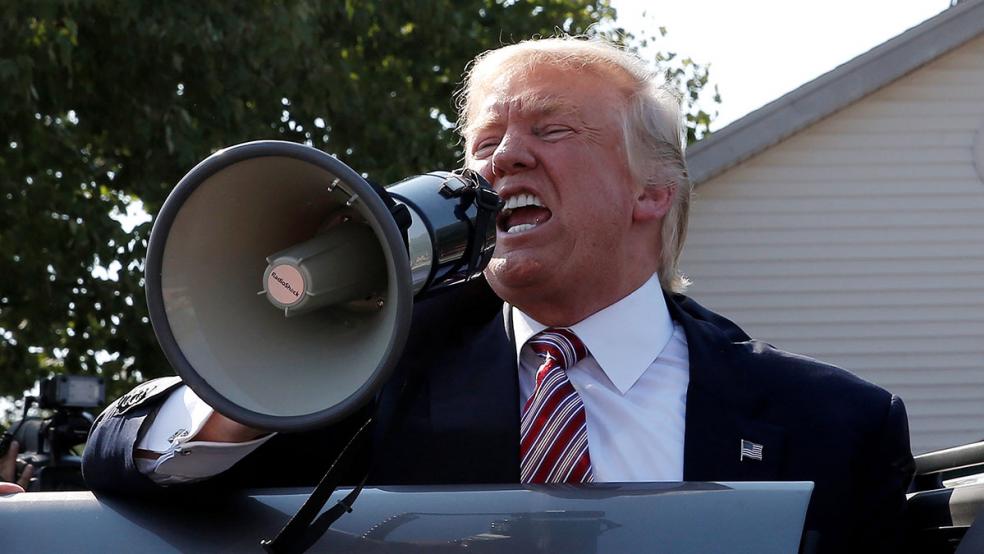Heading into a Monday night speech in the swing state of Colorado, the plan for Donald Trump was to move on from a damaging week by playing to his strengths. He would play up his career in business and his accumulation of what he claims is enormous personal wealth. At the same time, he would argue that his opponent, Democrat Hillary Clinton, has spent most of her life in the public sector, and only became rich after her husband left the White House by playing on the connections they both developed while he was president.
However, in what has become typical Trump fashion, it wasn’t enough to claim that his background and experience give him the knowledge needed to boost the US economy and that Clinton’s lack of private sector experience is a liability. He had to paint Clinton as not just the wrong choice for American, but as evil.
Related: Clinton Stays in the Left Lane While Passing Trump
Clinton is not just a creature of the federal government, but “the ringleader of a criminal enterprise” who has “corrupted our government at the highest levels.” According to Trump, she is “a corrupt public official breaking the law and putting her government office up for sale.”
Somehow Clinton, whose last post in government was Secretary of State, has not just failed to help the American economy grow fast enough, but “she’s brought massive poverty for everyone.” Clinton “wants to trap poor African-American and Hispanic children in failing government schools because she wants the money from the teachers’ union.”
The calumny went on and on, and to be clear, this wasn’t Trump freelancing, or going off-script. The wild accusations are all in the prepared text that was distributed to the media. That means that, presumably, high-level members of the Trump campaign team vetted it in advance.
That should speak volumes about the type of campaign the Republican presidential nominee is running.
Related: Mike Pence vs. Tim Kaine: Why This Debate Really Counts
Perhaps the bile directed at Clinton in the second half of the speech last night had something to do with Trump needing to spend the first half of the speech defending his reputation as a businessman after the revelation over the weekend that he claimed a $916 million loss in a single year when he filed his taxes in 1995.
In the GOP nominee’s telling, the move -- by any measure a massive and embarrassing financial setback -- was actually an example of his own “brilliance.” (The campaign flagged this particular bit of spin by sending out top surrogates, New Jersey Gov. Chris Christie and former New York mayor Rudy Giuliani, with instructions to show that Trump’s disastrous losses in 1995 were actually proof of his “genius.”)
“As a businessperson, I have legally used the tax laws to my benefit, and to the benefit of my company, my investors, and my employees,” he boasted.
Related: For Trump, Losing $916 Million, Dodging Federal Taxes and Lawsuits = ‘Genius’
After describing the recession of the early 1990s as though it rivaled the Great Depression, he said, “I was able to use the tax laws of this country, and my skills as a businessperson, to dig out of this real estate depression when few others did. In those most difficult times, when so many had their backs to the wall, I reached within myself and delivered for my company, my employees, my family and the communities where my properties existed.”
He went on to brag that he had never declared personal bankruptcy, even as many other businesses failed. That, of course, conflates personal bankruptcy with business bankruptcy -- something Trump actually has taken advantage of many times in his career, leaving investors and lenders with pennies on the dollar even as he escaped with minimal personal financial damage.
In his public statements, Trump appears to be retreating further into a rhetorical fantasyland. The real question now is just how many voters are going to be willing to follow him there in November.





